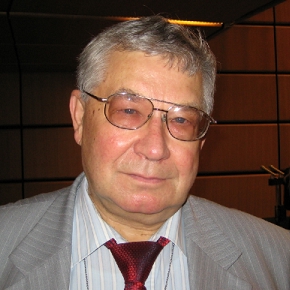 |
||
|
Fuad Akhundov, Chief Executive Officer of AKKUYU NPP JSC, meets members of Mersin Economic Platform Press Service, Akkuyu NPP, PUBLISHED 22.07.2014 Fuad Akhundov, Chief Executive Officer of AKKUYU NPP JSC, has participated in a traditional religious dinner, iftar (an evening meal during the sacred month of Ramadan), which was also attended by leaders from various companies and associations, brought together by the Mersin Economic Platform (MEP). The MEP representatives and Fuad Akhundov exchanged their views regarding the “Akkuyu” NPP project. During the conversation, the leader of AKKUYU NPP JSC said, “The construction of the first NPP in Turkey is crucial for the nation’s economy and for its future. We would like to involve Turkish construction companies in order for them to be able to benefit from the project as much as possible. Necessary documents are being prepared, and as soon as permits and licenses are obtained, we will directly proceed to the construction of the nuclear plant. We offer cooperation and look forward to doing this job with you. Hopefully, our project will yield tangible results for all of its participants in the short run.” Speaking of the EIA (Environmental Impact Assessment) Report review, the CEO of the Project Company said that “Akkuyu” NPP would be the first nuclear power plant in Turkey. “It is therefore quite reasonable that some delay may occur. Each issue within the Report is being considered to the smallest detail. While such documents total 500 pages in world-wide practice, in our case it is a document of 3,600 pages where we answer all questions that concern people of the Republic of Turkey. Hopefully, the Report review will result positively in the end,” Fuad Akhundov added. Business people of Mersin asked the leader of the Project Company the following question: “How do you intend to overcome the fear that part of the local population have of nuclear power?” The CEO of the AKKUYU NPP JSC answered, “If we consider the influence of nuclear power on the tourism sector and agriculture, perhaps France will be the most telling example. The country satisfies up to 75% of the domestic energy demand using nuclear generation. Today NPPs cover 13% of the global energy demand. Nuclear power technologies are used in the world’s largest economies. Nuclear power plants do not affect atmosphere, soil or sea water. Fears of nuclear power are caused by misinformation, insufficient understanding or lack of information on technologies. These fears are expected to be dealt with by actively raising public awareness in the Mersin Province.” Then business people from Mersin asked when tenders would be invited to procure construction materials for “Akkuyu” NPP. Fuad Akhundov answered, “We are currently trying to adapt procurement procedures to the conditions existing in the Republic of Turkey, so procurement requirements may be revised. As a result, procurement will be based on a model that is comprehensible to representatives of Turkish business. Procurement procedures are expected to be formulated in the near future. At this point, even though the quality of goods and services meets the specified requirements, some business people have difficulties working with us because they do not speak the foreign language. Procurement management will be arranged as far as possible in accordance with the procedures applicable in Turkey. The large-scale procurement process has not got underway yet, so Turkish companies still have time to get prepared.” Fuad Akhundov, Chief Executive Officer of AKKUYU NPP JSC, drew the attention of the audience to the advanced technologies, adopted for the “Akkuyu” NPP project, “The ‘3+’ generation VVER-1200 type reactors, which will be used at the plant, are equipped with both active and passive safety systems. These systems will not allow an operator of the power unit to make an error. The passive safety system, for example, is designed so as to operate by itself, without any intervention, in the event of an accident. It does not require power supply and is based on the laws of physics. Furthermore, even if an airplane crashes into the power unit building, the reactor will not be affected. There has been no NPP in Turkey so far, but similar power plants are available in many countries.” Faruk U"zel, the Director of the “Akkuyu” NPP’s Public Information Center (PIC) in Mersin, said that the total installed capacity of the first Turkish power plant would amount to 4,800 MW. He said, “Turkey is currently second after China in terms of economic growth rates. The nation’s energy requirements are increasingly growing. Moreover, the Republic of Turkey has an objective of assimilating technologies and building the third NPP in the country on its own. Waste generated by hydrocarbon-fuelled power plants cause damage to the environment. NPPs produce zero emissions of harmful gases, thus allowing nuclear power to be referred to as environmentally friendly power generation. The “Akkuyu” NPP construction site was selected back in the 1970s. It was recognised the most suitable and the safest based on dozens of criteria and, first of all, because of its low seismicity. We did additional survey at the initial phase of the project, during which we interacted with many reputable organizations. Over 600 wells were drilled at the site. Based on the survey, it was recognised safe for the construction of an NPP. In addition, the NPP is supposed to be designed to withstand intensity 9 earthquakes. There are already 190 Turkish students being trained in nuclear disciplines in Russia, and the fourth group is going for training this year. Back in Turkey, these young specialists will form a team of technical and engineering personnel at the NPP. The construction phase, which will take a total of 10 years, will also engage up to 12,500 people. As a result, Turkey will obtain nuclear technology infrastructure, and the project will also give a new course of development to Turkish industry.” When Fuad Akhundov and Faruk U"zel had answered all questions posed to them, Kemal Kac,maz from the MEP Management Board addressed the audience with a short speech. He told about his trip to Russia in 2013 as a member of a delegation of Turkish entrepreneurs. The delegation visited the site of Novovoronezh NPP-2 then under construction, which is referential to “Akkuyu” NPP. In the course of the study trip, Russian engineers answered all questions from delegation members, Kac,maz said. He added, “We visited the NPP building and saw everything with our own eyes, and we saw for ourselves that thousands of people lived not far from the NPP. We want construction companies, located in the Mersin Province, to be actively engaged in the implementation of the “Akkuyu” NPP project.” Addressing the management of “Akkuyu” NPP, Kemal Kac,maz thanked them for the invitation to the iftar and for the opportunity to come together to discuss such an important project for the region. Other news: Russia May Sign Agreement to Build 8 Reactors in Iran A source close to the negotiations told journalists Thursday. Hungary Enacts Law to Expand Nuclear Power With Russian Aid Hungary’s president has signed a bill into law to expand a nuclear power plant in the country with Russian assistance. Hungary Lawmakers OK Russia Nuclear Plant Deal Russia will provide Hungary a loan of up to 10 billion euros ($13.5 billion) - around 80 percent of construction costs. Last news:
|
Hero of the day 
The ISTC Responsible Science Program and Subprogram Culture of Nuclear Nonproliferation The dual-use nature of nuclear technology consisting in the potential for its application equally in peaceful and military sphere is the basic contradiction for the existing nuclear nonproliferation regime and comprehensive development of the nuclear power and nuclear fuel cycle. INTERVIEW
Jerry Hopwood OPINION
Joint Plan of Action |
Licence Р В Р’ВВР В Р’В» №ФС77-30792. ATOMINFO™ trademark.

